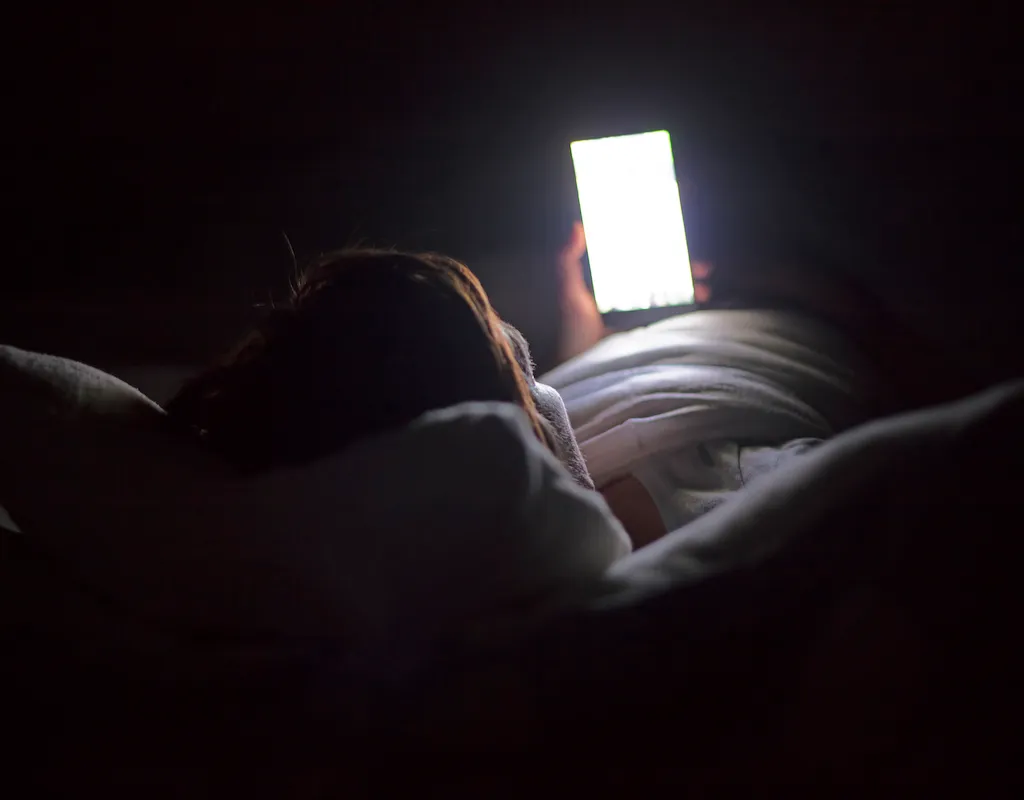According to the Sleep Foundation, a healthy amount of sleep for an adult per night is 7-8 hours. However, the reality is that more than one third of us get less than 7 hours of sleep per night on average.
So why, as adults, have we become so rubbish at sleeping? And why are women worse at it than men? Let’s dive under the covers to find out…
Quality sleep isn’t something we should be considering a luxury. It’s a fundamental pillar of overall wellbeing. Research consistently tells us of the profound impact that sleep has on our physical and mental health, as well as our emotional resilience.
In a normal sleep period, a person experiences four to six sleep cycles which can vary in length but most last about 90 minutes. Our REM, or rapid eye movement sleep, makes up about 20-25% of the total sleep in healthy adults.
As we cycle through NREM, or non-rapid eye movement sleep, various bodily functions slow down or stop altogether. Our metabolism drops by 15% and both heart rate and blood pressure levels go down.
And, on average, we spend about two hours per night dreaming, which happens mostly during REM sleep.
“If the brain doesn’t get enough REM sleep, it makes you feel awful the next day, but there are also implications for diseases such as Alzheimer’s later on,” says Alison Francis, who has worked for 25 years as a sleep specialist.
Stage 3 NREM is our ‘deep sleep’ and is believed to be the most critical stage for regenerating our body and brain. Sadly, as we age, this stage tends to decrease.
Why are women worse sleepers than men?
Insomnia, a sleep disorder making it difficult to fall and stay asleep, affects up to 75% of older adults, with women being 40% more likely to suffer from insomnia than men.
“One of the primary reasons is the fluctuations in powerful female hormones,” says Dr Guy Meadows, a sleep physiologist who has been running workshops for chronic insomnia sufferers since 2011.
“Progesterone and oestrogen play such an important role in sleep and fluctuate on a monthly basis. They fluctuate with pregnancy and then they fluctuate and then decline with menopause.”
According to the Sleep Foundation, premenstrual syndrome or tension (PMS or PMT) makes women at least two times as likely to report insomnia before and during their period.
While around 50% of pregnant women experience insomnia-like symptoms, and after having the child, sleep satisfaction and duration quite predictably decrease significantly.
New mothers then lose on average 62 minutes of sleep per night, as opposed to just 13 minutes for new fathers. The effects of this regular sleep deprivation can last up to six years, but women also tend to experience more anxiety once they enter motherhood which affects their sleep.
“Women bear the brunt of looking after children and elderly parents, which means less time for prioritsing sleep and self-care activities” says Dr Meadows.
As mentioned, during menopause hormones go into free-fall resulting in night sweats and hot flushes. It’s no wonder then that sleep disorders affect between 39 and 47% of perimenopausal women and 35% to 60% of postmenopausal women.

Lots of different factors play a part in having poor sleep, but the above statistics alone prove that we females are already playing a losing game on the field of dreams.
The good news is that according to sleep experts, we can train ourselves to sleep better. Here are some do’s and don’ts when it comes to catching those zzz’s.
Do…
- Get to bed on time. According to a study by Columbia University, women who regularly push back their bedtime by one or two hours are increasing their risk of heart disease. Consistency will reinforce your body’s natural circadian rhythm.
- Get exposure to natural light as soon as you wake up. Try getting outdoors first thing to receive natural sunlight as this will also help to regulate your internal clock and make you more alert during the day.
- Invest in a comfortable mattress and pillows that provide the proper support. The right balance between comfort and support is key.
- Keep the bedroom cool, between 15-20°C. A cooler temperature will support your own body’s natural temperature drop during sleep.
- Consider dimming lights an hour before bedtime to signal to your body that it’s time to wind down for the night.
- Try earplugs, white noise machines, or even calming sounds like oceans or rainfall to avoid any noise disruption and promote relaxation.
- Try deep breathing, meditation or gentle stretching before bed as they can help to lower blood pressure, lessen stress levels and prepare your body for sleep.
- Ensure you have a well-balanced dinner with a healthy mix of carbohydrates, proteins, vegetables and healthy fats and have your last meal of the day a few hours before bedtime to allow time to digest.
- Try a warm bath or shower an hour or two before bedtime as it will help lower your core temperature which is a vital circadian sleep signal.
- Regular physical activity is linked to better sleep. According to studies, you only need about 30 minutes of exercise a day to start seeing the benefits at bedtime. But try and complete your workout 1-2 hours before bedtime.
- Incorporate calming exercises like yoga or stretching into your evening routine to promote relaxation, improve blood flow and relieve muscle tension.
- Try journaling, mindfulness and meditation to help clear your mind before bedtime and reduce anxiety.
- Incorporate progressive muscle relaxation by tensing and releasing each muscle group one at a time to enhance an overall sense of calm and relaxation.
- Consider putting a few drops of lavendar oil on your pillow or on your temple – many, including several credible studies, hail its sleep-inducing properties.
Don’t…
- Have too many long or irregular naps as they can interfere with nighttime sleep.
- Have screen time right before hitting the hay. Limit exposure to screens such as phones, tablets or computers at least an hour before you go to bed. The blue light is known to suppress melatonin, a hormone which regulates your sleep pattern.
- Have stimulants. Steer clear of caffeine and nicotine in the hours running up to bedtime as they can disrupt sleep regulation.
- Have a heavy, rich meal close to bedtime.
- Drink too much in the evening to minimise the chance of waking up for toilet trips during the night.
- Exercise vigorously too close to bedtime. Aerobic exercise releases chemicals called endorphins into your bloodstream and will energise your brain and body making it harder to fall asleep. In addition, your core temperature will be elevated right after a workout. About 30-90 minutes after exercise, it starts to drop, eventually bringing about feelings of sleepiness.
Final note
Remember that the path to better sleep requires patience and consistency and is unique to each individual, lifestyle, circumstances and habits, so it’s important to find what works best for you and stick with it. Sweet dreams!
Top image credit: Getty Images
